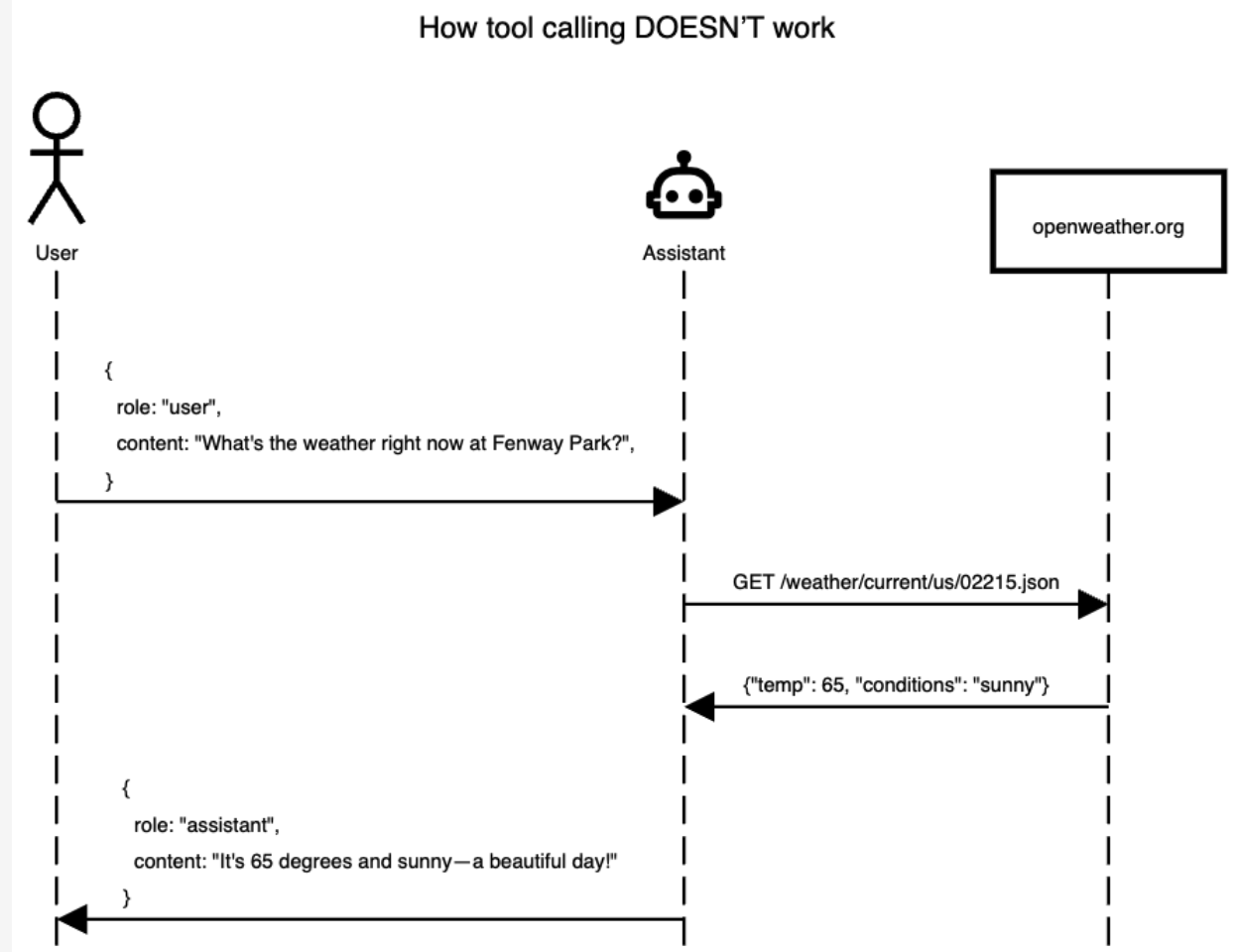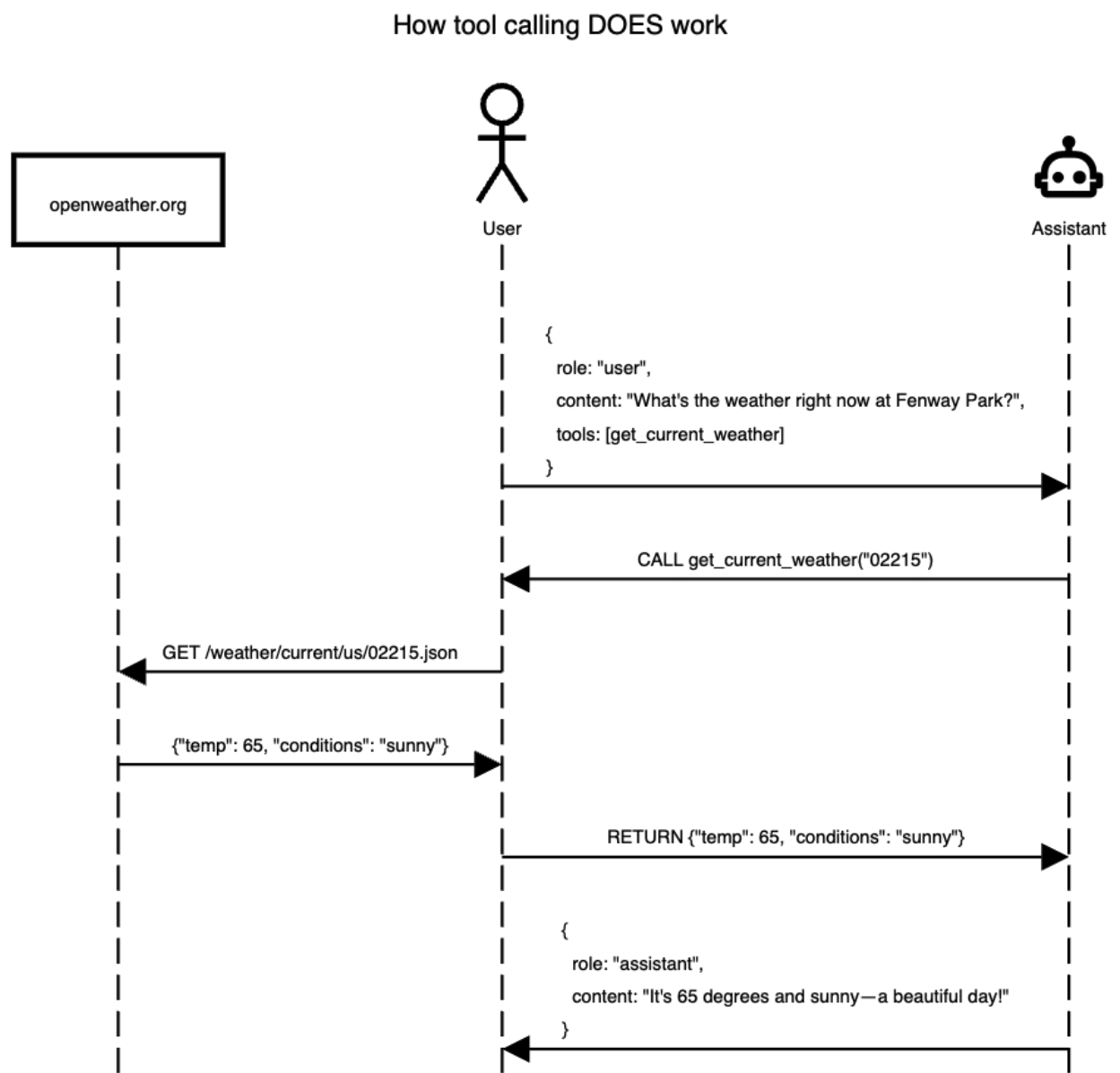Tool Calling
What is Tool Calling?
Allows LLMs to interact with other systems
Supported by most of the newest LLMs, but not all
Sounds complicated? Scary? It’s not too bad, actually…
Reference: https://jcheng5.github.io/llm-quickstart/quickstart.html#/how-it-works
How it does NOT work

How it DOES work

A tool is a function
- A tool call is a function that the LLM can use
- It can either infer what the function does by the function name, docstring, and/or parameter names
- You can also provide it the context you want
Example: Weather Tool
To ask the LLM about the weather in the current location we need to write a function that does a few things:
- Geocode a location to a latitude and longitude (this can also be an API)
- Use the latitude and longitude in an API that can look up the weather
Example Weather tool - Geocode
import requests
from typing import Dict
def get_coordinates(location: str) -> Dict[str, float]:
base_url: str = "https://nominatim.openstreetmap.org/search"
params = {
"q": location,
"format": "json",
"limit": 1, # only return the top result
"addressdetails": 1, # include detailed address info
}
headers = {"User-Agent": "example_weather/1.0 (daniel.chen@posit.co)"}
response = requests.get(
base_url,
params=params,
headers=headers,
)
data = response.json()
lat = float(data[0]["lat"])
lon = float(data[0]["lon"])
return {"lat": lat, "lon": lon}Example Weather tool - Geocode
Example Weather tool - Weather
Example Weather tool - Weather
Example Weather tool - Register
Demo: Weather Python
import requests
from typing import Dict
from chatlas import ChatAnthropic
from dotenv import load_dotenv
load_dotenv()
def get_coordinates(location: str) -> Dict[str, float]:
base_url: str = "https://nominatim.openstreetmap.org/search"
params = {
"q": location,
"format": "json",
"limit": 1, # only return the top result
"addressdetails": 1, # include detailed address info
}
headers = {"User-Agent": "example_weather/1.0 (daniel.chen@posit.co)"}
response = requests.get(
base_url,
params=params,
headers=headers,
)
data = response.json()
lat = float(data[0]["lat"])
lon = float(data[0]["lon"])
return {"lat": lat, "lon": lon}
def get_weather(lat: float, lon: float):
base_url = "https://api.open-meteo.com/v1/forecast"
params = {
"latitude": lat,
"longitude": lon,
"current_weather": True,
}
response = requests.get(
base_url,
params=params,
)
data = response.json()
return {k: v for k, v in data.items()}
chat = ChatAnthropic(
system_prompt=(
"You are a helpful assistant that can check the weather. "
"Report results in imperial units."
),
)
# chat.list_models()
chat.register_tool(get_weather)
chat.register_tool(get_coordinates)
chat.chat("What is the weather in Seattle?")Demo: Shiny Application
import requests
from typing import Dict
from chatlas import ChatAnthropic
from dotenv import load_dotenv
from shiny.express import ui
load_dotenv(verbose=False)
def get_coordinates(location: str) -> Dict[str, float]:
base_url: str = "https://nominatim.openstreetmap.org/search"
params = {
"q": location,
"format": "json",
"limit": 1, # only return the top result
"addressdetails": 1, # include detailed address info
}
headers = {"User-Agent": "example_weather/1.0 (daniel.chen@posit.co)"}
response = requests.get(
base_url,
params=params,
headers=headers,
)
data = response.json()
lat = float(data[0]["lat"])
lon = float(data[0]["lon"])
return {"lat": lat, "lon": lon}
def get_weather(lat: float, lon: float):
base_url = "https://api.open-meteo.com/v1/forecast"
params = {
"latitude": lat,
"longitude": lon,
"current_weather": True,
}
response = requests.get(
base_url,
params=params,
)
data = response.json()
return {k: v for k, v in data.items()}
chat_client = ChatAnthropic()
chat_client.register_tool(get_coordinates)
chat_client.register_tool(get_weather)
chat = ui.Chat(id="chat")
chat.ui(
messages=[
"Hello! I am a weather bot! Where would you like to get the weather form?"
]
)
@chat.on_user_submit
async def _(user_input: str):
response = await chat_client.stream_async(user_input, content="all")
await chat.append_message_stream(response)You try: register a tool
PyData Seattle. 2025. https://github.com/chendaniely/pydata-seattle-2025-llm